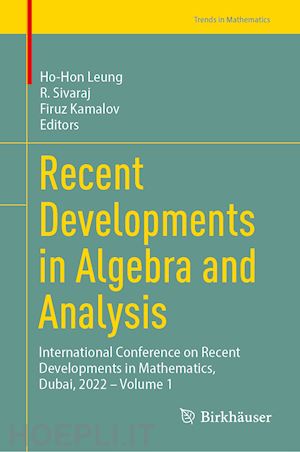

Questo prodotto usufruisce delle SPEDIZIONI GRATIS
selezionando l'opzione Corriere Veloce in fase di ordine.
Pagabile anche con Carta della cultura giovani e del merito, 18App Bonus Cultura e Carta del Docente
This volume collects the proceedings of the International Conference on Recent Developments in Mathematics (ICRDM), held at Canadian University Dubai, UAE, in August 2022. It is the first of two volumes, this first volume focuses on recent advances in algebra and analysis, and the second volume covers more applied topics. Each chapter identifies existing challenges in these theoretical areas, and highlights the importance of establishing new theorems and algorithms to address them. Recent Developments in Algebra and Analysis will appeal to a range of postgraduate students and researchers who are interested in exploring more on these areas and play an integral role in modern science.
Algebra: Fuzzy Quotient BM-algebra with respect to a Fuzzy BM-ideal (Indhira).= New Classes of the Quotient Permutation BNAlgebras in Permutation BN-Algebras (Khalil).- Interpretation of Skew Ideals with Relators in Join Skew Semilattice (Ravi Kumar).- On certain semigroups of order-decreasing full contraction mappings of a nite chain (Zubairu).- A Novel Concept of Neutrosophic_Fuzzy Sets in ?-algebra (Shanmugapriya).- Controllable Fuzzy Neutrosophic Soft Matrices (Kavitha).- An MCDM based on Neutrosophic Fuzzy SAW Method for New Entrepreneurs in Organic Farming (Anita).- Decision Making Problem based on Complex Picture fuzzy soft set using ELECTRE I Method (Shanthi).- Resultant of an equivariant polynomial system with respect to direct product of symmetric groups (Nonkané).- Color Image Filtering using Convolution Fuzzy Neural Network (Shanthi).- Some combinatorial results for partial and full symmetric semigroups (Abdullahi).- Integrated tomato cultivation using Back Propagation Neural Network On Bipolar Fuzzy Sets (Shanthi).- Cryptographic coding of Some Fibonacci Type Numbers to Determine Repeated Steps of their Residues (Srinivas).- On Permutation Distributive BI-Algebras (Khalil).- A Note on Multiplicative Ternary Hyperring (Masud Molla).- ?eutrosophic ?-ideals and ?-filters of BF-algebra (Rajani).- Study of MBJ – Neutrosophic Level sets in Beta – Ideal (Surya).- Maximal solution of tropical linear systems by normalization method (Perumal).- A Theoretical Perception on Interval Valued-Fuzzy I2-Subalgebraic Topology (Hemavathi).- A Specific key sharing protocol among multi-user using non-commutative group for Telecare Medicine Information System (Kaliyappan).- Some analytic and arithmetic properties of integral models of algebraic tori (Bagdasaryan).- On Algebraic Characteristics of Anti-Fuzzy Sub-groups (Premkumar).- Multi Criteria Decision Making with Bipolar Intuitionistic Fuzzy Soft Expert Sets (Shanthi).- Efficiency of eco friendly construction materials in interval valued picture fuzzy soft environment (Shanthi).- Analysis: A Subclass of Close-To-Convex Function Involving Srivastava-Tomovski Operator (Umadevi).- On the newly generalized absolute Hausdorff summability of orthogonal series (Kamalakkannan).- Identification and Recognition of Bio Acoustic Events in an Ocean Soundscape Data using Fourier Analysis (Vairamuthu).- Neutrosophic Nano MContinuous Mappings Via Neutrosophic Nano Topological Spaces (Vadivel).- Summability in Measure of Two Dimensional Walsh-Fourier Series (Goginava).- Some Topological Operators Using Neutrosophic Nano MOpen Sets (Vadivel).- Approximation of Functions in a Weighted Lp-Norm by Summability Means of Fourier Series (Saini).- Third Hankel Determinants H3(1) and H3(2) for Bi-Starlike Functions (Thambidurai).- (j, k)th Proximate Order and (j, k)th Proximate Type of Entire Function (Azizul Hoque).- Fractals via Self-Similar Group of Fisher Contractions (Easwaramoorthy).- On alternating direction implicit solutions of 2D Kelvin–Helmholtz instability problem (Takhirov).- On hyper-relative (m, s) order of entire functions in the light of central index (Dutta).- Some Estimates for a Certain Set of Regular Functions Associated with Generalized Struve Function, Error Function, Bell Numbers and Involving Subordination and q-Di?erentiation (Abiodun Oyekan).
Ho Hon Leung is an associate professor at UAE University. He received his PhD in mathematics from Cornell University in 2011 and his BSc from Imperial College London in 2006. His research interests lie in the intersections of geometry, algebra and combinatorics. He is also interested in fluid dynamics and mathematics education.
R Sivaraj is working as an Associate Professor in the Department of Mathematics, Dr B R Ambedkar National Institute of Technology, Jalandhar, Punjab, India. He has published 55 manuscripts in SCI/SCOPUS indexed journals which includes several Q1/Q2 journals. He has served as a Guest Editor for several journals and book series including The European Physical Journal Special Topics, Trends in Mathematics, Lecture Notes in Mechanical Engineering, and AIP Conference Proceedings. He has published a book in Chapman and Hall/CRC, New York. He has organized several international conferences and workshops to promote research in India and UAE.
Firuz Kamalov is an associate professor of mathematics at Canadian University Dubai, UAE. He received his PhD at University Nebraska - Lincoln in 2011, where he was an Othmer Fellow. His research interests include functional analysis, applied mathematics, statistical learning, and time series forecasting. He is the managing editor of Gulf Journal of Mathematics and an associate editor of Journal of Intelligent and Fuzzy Systems. Dr Kamalov is a recipient of multiple research grants totalling over USD 1 million.











Il sito utilizza cookie ed altri strumenti di tracciamento che raccolgono informazioni dal dispositivo dell’utente. Oltre ai cookie tecnici ed analitici aggregati, strettamente necessari per il funzionamento di questo sito web, previo consenso dell’utente possono essere installati cookie di profilazione e marketing e cookie dei social media. Cliccando su “Accetto tutti i cookie” saranno attivate tutte le categorie di cookie. Per accettare solo deterninate categorie di cookie, cliccare invece su “Impostazioni cookie”. Chiudendo il banner o continuando a navigare saranno installati solo cookie tecnici. Per maggiori dettagli, consultare la Cookie Policy.